Vieille Martin
4 participants
 Vieille Martin
Vieille Martin
Come see "Lula" on display at Gruhn Guitars. "This is the most deluxe Martin guitar made during the tenure of C.F. Martin, Sr. known to have survived to the present time." - George Gruhn
The following is from: Hutton's Guide to Martin Guitars 1833 - 1969 by Greig Hutton
The 1852 "Elegant' or "Lula" Guitar
There are three remarkable letters in the Martin archive related to this instrument. The following are excerpts from the three letters. The first letter, from Peters & Sons, Cincinnati, Ohio, is dated October 12, 1852:
"N. B. Please write us at Cin(cinnati) the cost, or supposed cost, of a Guitar of the following description: A Guitar of the very finest make (same shape as the fine one we have on consignment)) with rosewood inside case. The Patent Head to be of Plated Gold and end of screws etc to be pearl tiped (sic). Frets to be Gold (18 carat) and the fingerboard to be covered with pearl, instead of ebony. The man is not particular about the price but wants the best in the country."
The second letter, dated November 8, 1852, continues:
"The gentleman who wants the elegant guitar is at our elbow. He wants as good a guitar as you can make for $100 wholesale. The head to be patent head - the metal part of the head to be galvanized with gold. The frets to be 14 carat gold - worth 50 ets per pennyweight. The spaces between the frets to be made of pearl.
There must be an extra case, of rosewood, such as the one we have of yours. Also, the shape of the instrument to be the same as the one we have. Above all, the gentleman wants to know soon he can have the instrument, as it is for a lady who is about to he married."
The third and final letter, dated November 24, 1852, further defined the specifications:
Make the fine Guitar, with a black neck veneered with ebony. Make the sounding board or top pale yellow. Make the Guitar, same size as the one we have on con(signment). Make the neck a little narrower. It must not cost us more than $110 dollars, but the frets must be gold as we last wrote you. You must cheapen it a little on the Rosewood case and above all, don't forget to send it away within three weeks from the receipt of our letter."
In the August 1986 issue of Guitar Player magazine is an article by George Gruhn and Suzy Newton concerning this guitar. The article identifies an interesting feature not mentioned in the letters in the Martin archive. On top of the rosewood case the name "Lula" is inlaid in script letters, probably the name of the lady who received the guitar as a wedding gift."
The article suggests the material for the inlay used was brass but it is more likely that left-over gold fret wire was used for the inlaid letters. The pictures in the article were later reproduced in "Acoustic Guitars and Other Fretted Instruments" by George Gruhn and Walter Carter, pages 20 and 21. The pictures reveal a most unusual head stock, one not seen on any other Martin guitar of the period. Using this type of machine resulted in very narrow peg head slots. Martin selected these peculiar tuning machines because the dealer specified "the Patent head to be of plated gold". The external mounting plates of these unusual machines would have been much easier to plate than the machines Martin normally used.
This guitar has what is commonly known as the "renaissance" shape. Until the connection could be made between this guitar and the archival material, it was a matter of conjecture as to when these guitars were made. C. F. Martin did not record this different shape in the day book but we do know from correspondence that W. C. Peters & Sons had at least one more in stock with the same "renaissance" shape. This guitar is one of the few "milepost" instruments from the period because it can be accurately dated. We now know that the "renaissance" shaped guitars were made in the period from about 1843 to 1860. (See page 52, "10-string harp guitars").
The Ledger 1852-57 records this guitar as being shipped on December 27, 1852. For some reason this guitar was not recorded in the day book, so we do (not) have the detailed description Martin usually made in this period. Since Martin couldn't have received the last letter (dated November 24, 1852) before November 25 or 26 at the earliest, it is incredible that he was able to make such a stunning instrument in the period of only one month! The final wholesale cost of the guitar was $110.
.
#gruhnguitars #nashvilleguitar #vintageguitar #martinguitar #cfmartin #ornateguitar #lula #rareguitar #weddinggift #greatstories #huttonsguide #greighutton
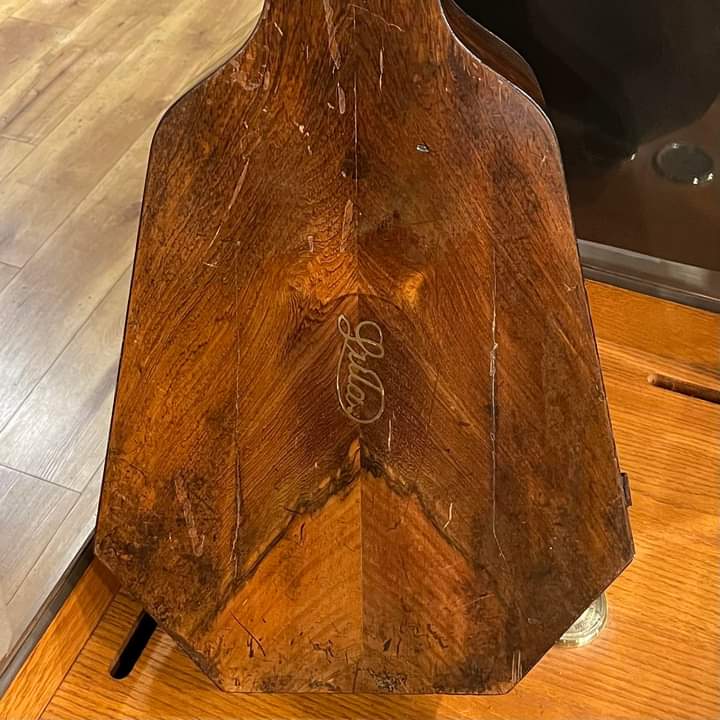
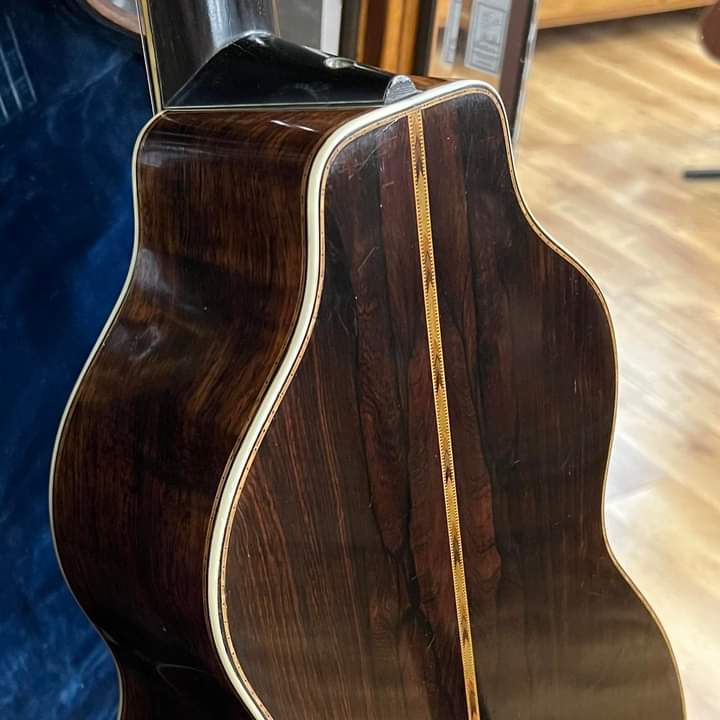
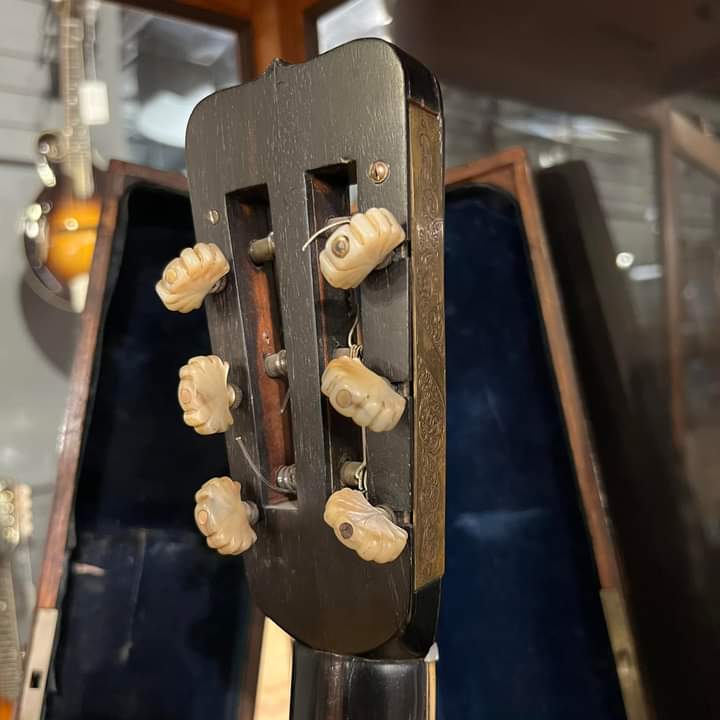
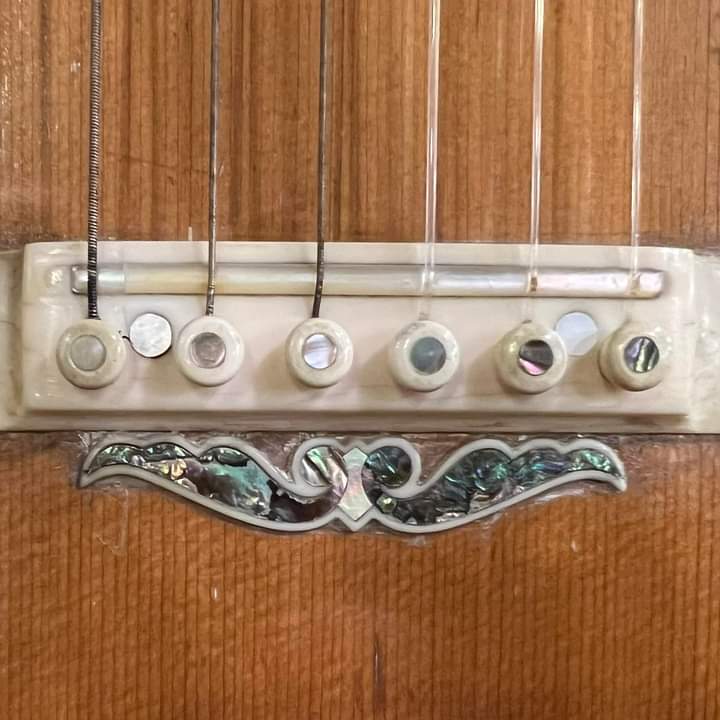
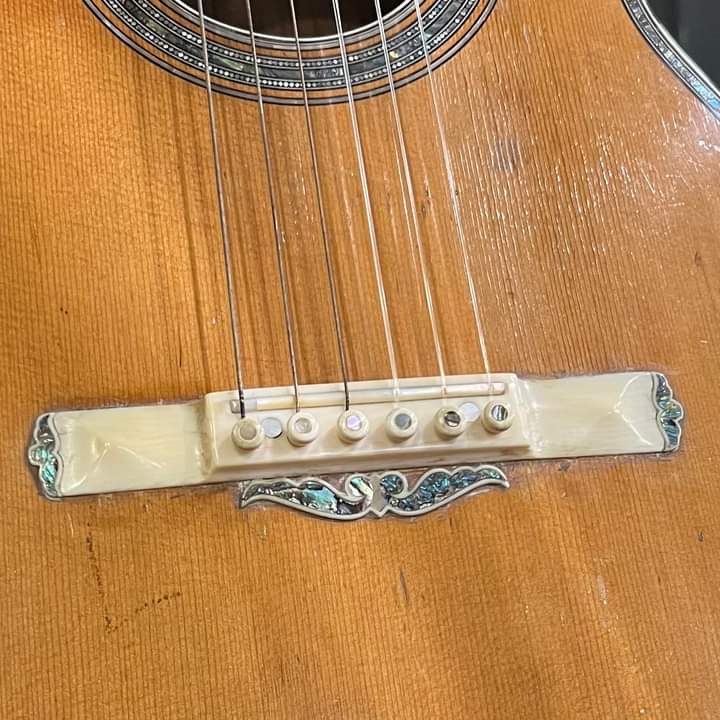
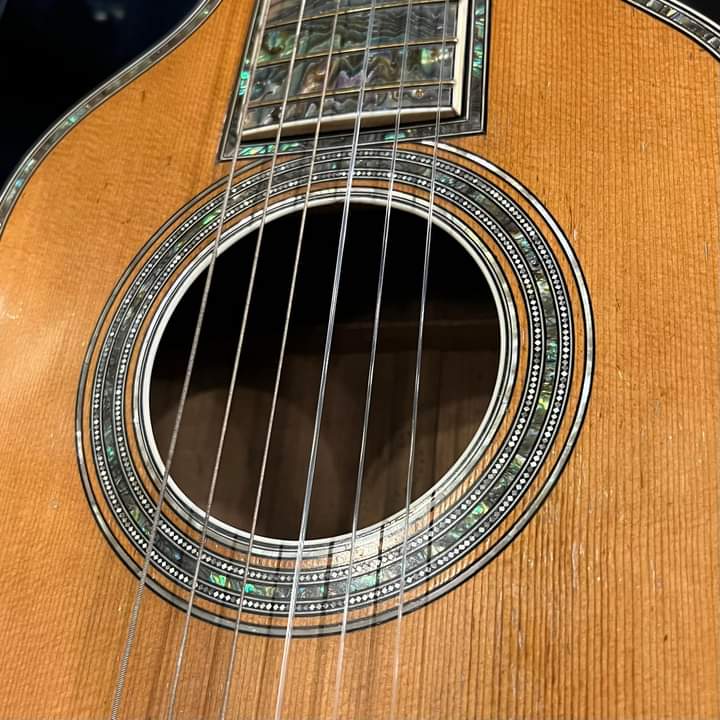

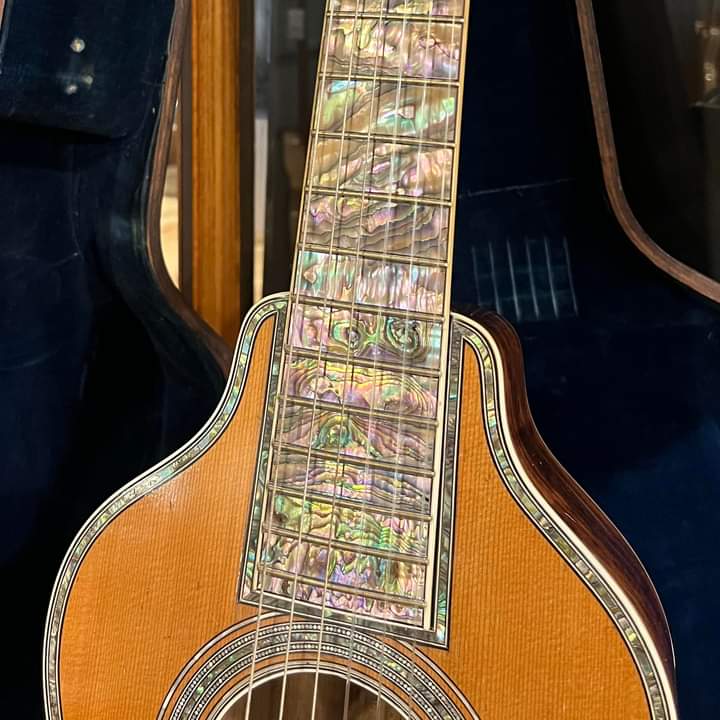
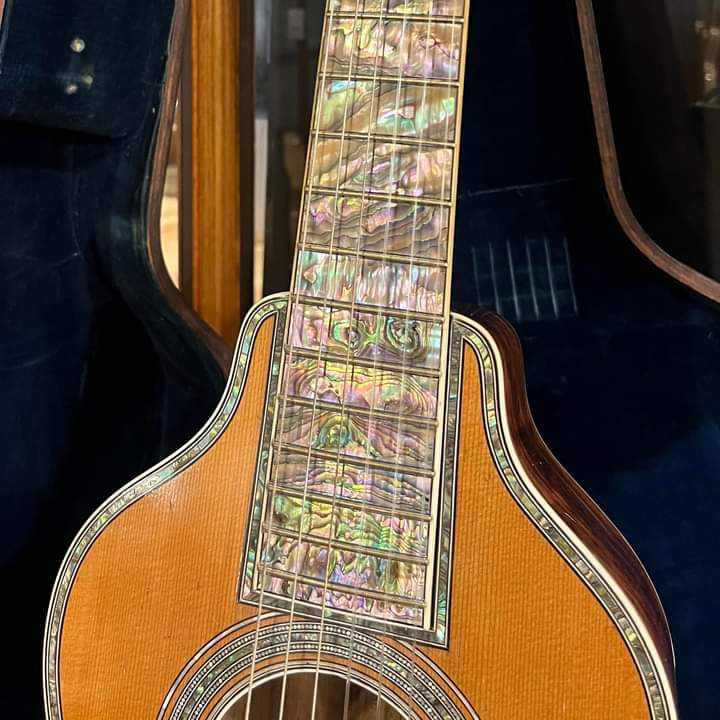



The following is from: Hutton's Guide to Martin Guitars 1833 - 1969 by Greig Hutton
The 1852 "Elegant' or "Lula" Guitar
There are three remarkable letters in the Martin archive related to this instrument. The following are excerpts from the three letters. The first letter, from Peters & Sons, Cincinnati, Ohio, is dated October 12, 1852:
"N. B. Please write us at Cin(cinnati) the cost, or supposed cost, of a Guitar of the following description: A Guitar of the very finest make (same shape as the fine one we have on consignment)) with rosewood inside case. The Patent Head to be of Plated Gold and end of screws etc to be pearl tiped (sic). Frets to be Gold (18 carat) and the fingerboard to be covered with pearl, instead of ebony. The man is not particular about the price but wants the best in the country."
The second letter, dated November 8, 1852, continues:
"The gentleman who wants the elegant guitar is at our elbow. He wants as good a guitar as you can make for $100 wholesale. The head to be patent head - the metal part of the head to be galvanized with gold. The frets to be 14 carat gold - worth 50 ets per pennyweight. The spaces between the frets to be made of pearl.
There must be an extra case, of rosewood, such as the one we have of yours. Also, the shape of the instrument to be the same as the one we have. Above all, the gentleman wants to know soon he can have the instrument, as it is for a lady who is about to he married."
The third and final letter, dated November 24, 1852, further defined the specifications:
Make the fine Guitar, with a black neck veneered with ebony. Make the sounding board or top pale yellow. Make the Guitar, same size as the one we have on con(signment). Make the neck a little narrower. It must not cost us more than $110 dollars, but the frets must be gold as we last wrote you. You must cheapen it a little on the Rosewood case and above all, don't forget to send it away within three weeks from the receipt of our letter."
In the August 1986 issue of Guitar Player magazine is an article by George Gruhn and Suzy Newton concerning this guitar. The article identifies an interesting feature not mentioned in the letters in the Martin archive. On top of the rosewood case the name "Lula" is inlaid in script letters, probably the name of the lady who received the guitar as a wedding gift."
The article suggests the material for the inlay used was brass but it is more likely that left-over gold fret wire was used for the inlaid letters. The pictures in the article were later reproduced in "Acoustic Guitars and Other Fretted Instruments" by George Gruhn and Walter Carter, pages 20 and 21. The pictures reveal a most unusual head stock, one not seen on any other Martin guitar of the period. Using this type of machine resulted in very narrow peg head slots. Martin selected these peculiar tuning machines because the dealer specified "the Patent head to be of plated gold". The external mounting plates of these unusual machines would have been much easier to plate than the machines Martin normally used.
This guitar has what is commonly known as the "renaissance" shape. Until the connection could be made between this guitar and the archival material, it was a matter of conjecture as to when these guitars were made. C. F. Martin did not record this different shape in the day book but we do know from correspondence that W. C. Peters & Sons had at least one more in stock with the same "renaissance" shape. This guitar is one of the few "milepost" instruments from the period because it can be accurately dated. We now know that the "renaissance" shaped guitars were made in the period from about 1843 to 1860. (See page 52, "10-string harp guitars").
The Ledger 1852-57 records this guitar as being shipped on December 27, 1852. For some reason this guitar was not recorded in the day book, so we do (not) have the detailed description Martin usually made in this period. Since Martin couldn't have received the last letter (dated November 24, 1852) before November 25 or 26 at the earliest, it is incredible that he was able to make such a stunning instrument in the period of only one month! The final wholesale cost of the guitar was $110.
.
#gruhnguitars #nashvilleguitar #vintageguitar #martinguitar #cfmartin #ornateguitar #lula #rareguitar #weddinggift #greatstories #huttonsguide #greighutton












_________________
Jean-Marie Fouilleul n° 425,500, 500/68
OM Thomas Fejoz n°102
https://remylefer.bandcamp.com/follow_me
https://open.spotify.com/album/6trcdKDEqGm8CDlKj8yFiQ?si=GVrBDsDcSWmp1FXnfT2iSw&context=spotify%3Aalbum%3A6trcdKDEqGm8CDlKj8yFiQ
didier13 aime ce message
 Re: Vieille Martin
Re: Vieille Martin
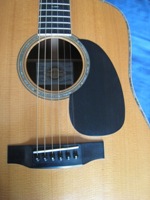
Coriolan92- Messages : 5398
Date d'inscription : 28/09/2008
Age : 73
Localisation : 92 et 35
 Re: Vieille Martin
Re: Vieille Martin
Le case à l'air extraordinaire 
gasteropode- Messages : 430
Date d'inscription : 07/09/2016
Localisation : Paris
 Re: Vieille Martin
Re: Vieille Martin
Impressionnante guitare ! pour autant je ne la trouve pas vraiment belle si ce n'est la qualité des matériaux utilisés , et l'étui en Rio 
ça je ne l'aurait même pas imaginé !
le genre de guitare au prix inestimable ...
ça je ne l'aurait même pas imaginé !
le genre de guitare au prix inestimable ...
 Sujets similaires
Sujets similaires» MARTIN OR NOT MARTIN ?
» Martin 0-16 NY + évolution des prix des Martin vintage
» CORDES FOLK
» Martin HD28 vs Martin D35
» Martin M36
» Martin 0-16 NY + évolution des prix des Martin vintage
» CORDES FOLK
» Martin HD28 vs Martin D35
» Martin M36
Permission de ce forum:
Vous ne pouvez pas répondre aux sujets dans ce forum